I was lucky enough to have been invited to the 2015 Palestinian Festival of Literature. Here is a dispatch from day one.
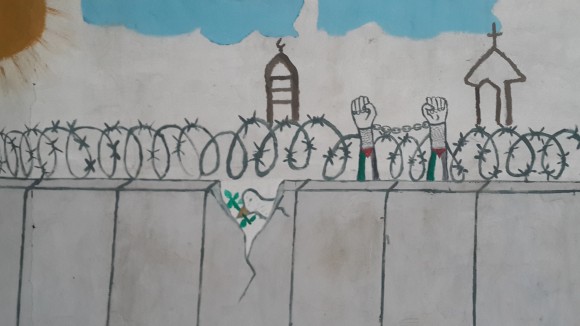
Israel happens so suddenly.
There we were one moment on the coach in Amman. Our tour guide, Ruby, started talking about crossing the border into the West Bank at exactly the same moment as the coach suddenly started reversing, a possibly inauspicious sign. Then we sped through Amman and its pleasant emptiness into the Jordanian countryside as Ruby gave us an introduction to the country that lasted about 5 minutes. “Jordan is the ‘safety bulb’ of the region”, she declared. It is the only Arab country that has peace with Israel other than Egypt.
“When people visit Jordan for 8 long days what do they do?” she asked cryptically. Ahdaf Soueif, equally cryptically, described us as “moving down vertically” from Amman to the King Hussein Bridge and then immediately abandoned all descriptions of geography.
Ruby pointed at distant inconsequential green things and mentioned that they were the site of amazing biblical happenings, happenings of huge moment that would produce new physical realities all these thousands of years later; the River Jordan, pumped dry, and the bridge above it, reluctantly patching together the two entities on either side, a conduit for all that sadness of terminated returns, and about turns.
Over we went and joined a queue of coaches. We stopped alongside a watchtower covered in the cobweb of camouflage netting. Two armed soldiers – who looked about 19 – stood having a laugh, elbows resting on the railing.
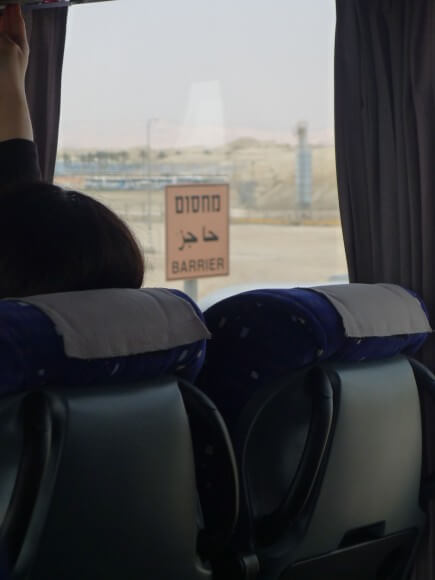
And then, suddenly, virtually all the Arabic disappeared, replaced by Hebrew and its spikiness. We got off the coach and fought our way into the scrummage.
So chaotic, so hot, so hellish, so reliant on pushing and angled elbows shoved in obstructive ribs was this checkpoint that Sinan Antoun and I both wondered out loud at the same moment: had we got things wrong, is in fact this checkpoint under Palestinian control? Did not the Zionist state after all make the desert bloom? And is it not an island of calm and order in the sea of barbarian anarchy that surrounds it? What then is this almighty hell.
This is how it works: first you dispense with your luggage at a counter via a functionary who will barely look at you and who processes your bag and sends it on its way on the belt into the arrivals hall directly behind him.
Next you queue up again, alongside: Chinese Christian pilgrims. A solitary nun in her holy starched white. Huge tourist groups from Malaysia wearing matching blue bags. Palestinians carrying their blue travel documents. In what seemed to be a concession to our discomfort the authorities have thoughtfully erected a large roaring industrial fan that belches out air and water droplets but which also blows cigarette smoke in everyone’s faces as well as raising noise levels . When you eventually reach the counter you are met by a young woman or man who smiles in your face and asks you how you are and then reads the name in your passport and says, “Sarah?” or whatever your name might be. If you were born somewhere unsavoury she or he will ask you about that. And she or he will put a green sticker on the back of your passport with 1-4 written in English and four characters in Hebrew. Like this:
Next you go into the actual border crossing building and must queue up again. Here you compare stickers and try and guess why some of you have numbers circled on it and others don’t. “Danger squiggles” Rob Stothard called them. He was born in Bahrain and the sticker official had commented on this. Ismail Richard Hamilton had the same. Born in Saudi Arabia. The x-ray machines meanwhile were manned by yet more pubescents, one of them in a t-shirt emblazoned with HOLLYWOOD. Here there was another mad scramble for the trays in which bags are placed on the x-ray belt.
Having gone through this stage you are at the final hurdle and enter a large hall where you see yet more ginormous queues and your heart drops. Two irascible women manned the counters where we queued up, variously talking to each other in Hebrew and barking at travellers in heavily-accented Arabic. At one point a verbal altercation broke out amongst passengers and one of the woman stood up and clicked her fingers and made some vague sounds of approbation reminiscent of a teacher dealing with difficult children.
At this counter the real questions begin. I got:
– what is your mother’s name
– what is your father’s name
– what is your father’s father’s name (twice)
– where do you live
– what is your job
– how long did you stay in Lebanon
– why did you go to Lebanon (twice)
Having established that my father’s name is Richard and his father’s name was Edmund the counter lady then made a phone call, maybe to the dangerous Christian names hotline, and then handed me a badly printed out form. she instructed me to piss off and fill it out. “Somebody will come and get you”, she said. Of note here is that they did not ask me whether I have any other nationality which surely would have been the fast track route to establish my potential persona non grata credentials rather than climbing up and down my family tree.
Lucky git and also priest Giles Fraser meanwhile sped through by virtue of busting out some basic conversational Hebrew and hung around outside eating falafels while we endured inside.
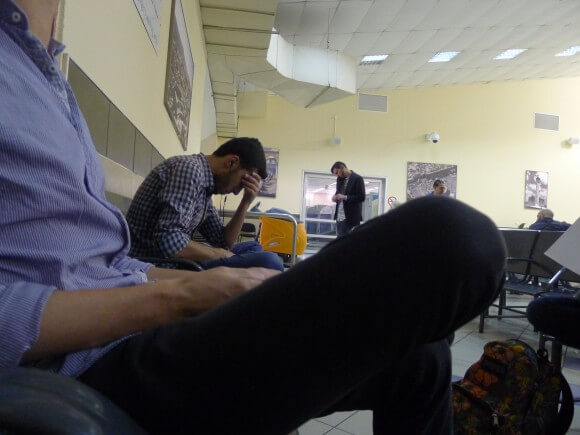
I joined the other Palfest participants lingering in this purgatory. Here the routine is that you fill out the crappy form while waiting for someone to call your name. And then you are asked more questions about your basic information – usually ones you have only just been asked – and so the effect is like when you sign up for a website and fill out all the boxes and then the net crashes and you have to fill it all out again. Like a sort of human Zionist Amazon My Account page. Then you are asked to sit down, and a little while later someone else calls your name again and (if you’re lucky) hands you your passport and off you go. By the time I joined the others people were trickling out one by one and these jokesters were already going on about people being voted off the island.
My name was called after an interminable amount of time by a short woman/girl who truly looked about 18. With each layer of interrogation the official gets younger seems to be the rule. If they keep you are overnight for questioning you are probably cross-examined by a toddler. Anyway this young woman took me aside and asked me the same questions about my father’s father’s name (still Edmund) but this time she mixed it up with what is your mother’s father’s name which unfortunately for me is Aref Ibrahim and which no matter how Croydon you try to pronounce it is inescapably Arab. Having established that my mother was born in Cairo she then pursued a line of questioning that revolved around trying to establish that I am from Hamas.
– do you ever go to Gaza
– do you ever go to Rafah
– do you have family in Gaza
– etc
I decided to cut to the chase and informed her that I am not of Palestinian origins if that’s what she’s getting at prompting her to respond with: “Yeah OK but you know borders change a lot round here ha ha ha”. I was so gobsmacked I could not reply, but she had finished with anyway so I trundled off and sat back down. Sinan meanwhile when they discovered he was of Iraqi origins was asked “and how are things in Iraq?” The only conclusion to be drawn from all this is that they are taking the piss.
Our time waiting was brightened up considerably by two revelations by Daniel Hilton:
1. he once lost his passport in Belize, and the temporary passport he got to replace it could not accommodate all his names so they just shortened one of his middle names and dispensed with his actual surname and now all his official documents list his surname as WILLI.
2. his hair is so very long in his very old passport photo that when he went to Syria the gentleman at passport control said to him, “but this is not you. This is a woman”. Behold:
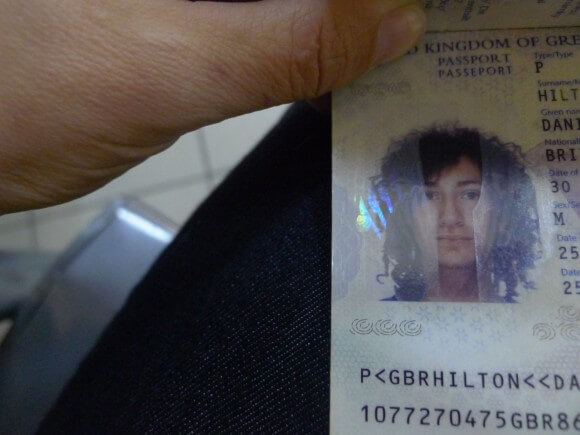
Nearly six hours after we reached the checkpoint a uniformed soldier called my name and this exchange took place:
Soldier: How are you?
Me: Fine
Soldier: Are you well?
Me: Yes
Soldier: I have some bad news and some good news.
Pause
Me: Oh
Pause
Soldier: You want the bad news or the good news first?
Me: ha ha the bad news
Soldier: [as he handed me my passport with the paperwork indicating I had been allowed entry] enjoy
Me: thank you [tosser]
Was this some supremely arch, dark commentary on Israeli society? Or was it just a dickhead toying with someone he knows is powerless.
I cannot begin to imagine how it must feel to be Palestinian to have to endure that kind of treatment, that humiliation, at the hands of an occupier in order to enter your own country. One of the Palfest participants whose father is a 1948 refugee said that he was able to visit Palestine in 1997 and that she has never seen the kind of pain etched on his face as she saw in pictures of him there. He felt that Palestine belonged to the Israelis by then, that they put down roots too deep to dig up.
And they’re still putting down those roots. When you leave the crossing two of the first things you really notice are illegal settlements sitting on top of the hills of the West Bank like mushrooms in a field at varying stages of maturity and the separation wall which separates not Israel from the occupied West Bank but the occupied West Bank from the occupied West Bank. There is a brutal absurdity to it all, these Wizard of Oz type settlements (some are the size, and have the permanence of a small town) gleaming in the distance, the Bedouins and their animals living in squalor below, the kaleidoscope of the number plates and the roads they will and will not allow you to travel down according to what colour it is and all of this glued together by the military, present everywhere you look.
There is a piece of graffiti near our hotel that I really like and which says: dawlat el lego, lego state.
Nothing built is immutable, everything can be taken apart.
Carr published this piece on her site in late May under the title, Lego State. She gave us permission to republish.
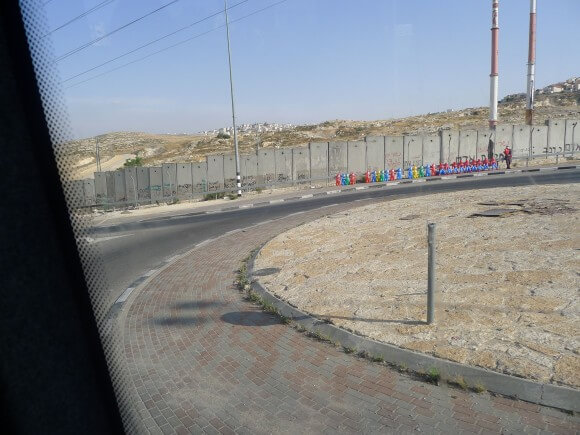


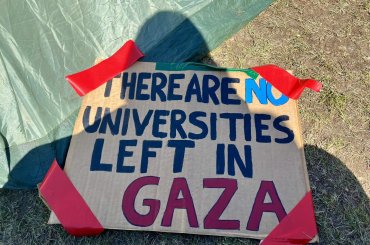
Thank you, Sarah.
My first hint that Israel was not all it seemed was in 1969 (I was 17). A Catholic priest who had just returned from what he called “The Holy Land” taught for a while at my school. He described witnessing Israeli soldiers beating up a hapless Palestinian at the Allenby Bridge crossing – “when soldiers beat you up,” he said, “you stay beaten up.” Nothing seems to have changed for the better since then.
Off topic, but on a more cheerful note, the priest (whose name I forget) introduced me to another thing that has stayed with me for life: the music of Paul Simon.
Thank you, Father.
“Or was it just a dickhead toying with someone he knows is powerless.”
Yep. There’s a lot of toying with powerless people by dickheads. There’s unfortunately also a huge amount of brutal oppression of powerless and vulnerable people by these dickheads.
Thanks for posting this Sarah. I’m glad you eventually made it through
Terrific read. Fine humour.
Love the “toddlers” comment. I think they are in charge…but with enhancements…like Chucky in that old 70’s horror movie.
Israeli leaders say the World has it wrong: Israel’s not Goliath; it’s still little puny David. The Goys still don’t realize they are all born anti-semites, just waiting for a decent opportunity to crawl out of the closet and pounce on some innocent Jews.
The Allenby bridge is absolutely horrible, but it used to be even worse during the Intifada, if you can believe that.
As for Jordan being the “safety bulb” of the Middle East, that really made me chuckle. I think the more appropriate term here would be “scavenger” or “carrion bird”.
Jordan’s whole history and fortunes were built by the tragedies of other peoples. Jordan could only become Jordan because the masses of Palestinian refugees made it so, and invested there and made it their home.
Since then, whenever there is a catastrophe in the region Jordan somehow benefits directly or indirectly. Jordan makes a killing off its side of the Alennby bridge. During the Iraq war, the wealthy Iraqis that could afford to leave moved their investments and lives to Jordan. During the Lebanon war, Lebanon became too dangerous for rich Gulf Arabs who usually escaped there to drink and screw. Suddenly this whole industry shifted towards Jordan, and you can still see its effects today in the amount of Gulf Arabs that roam Amman in the summer.